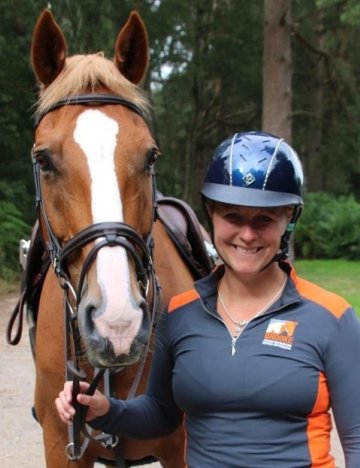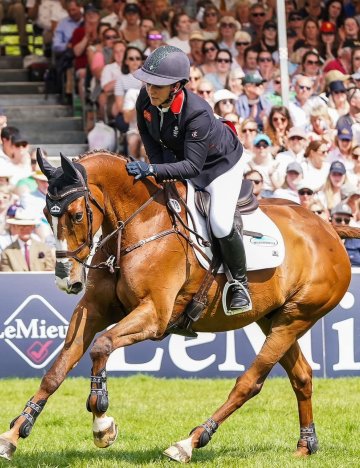Your horse handling questions answered
Olympic rider Gemma Stevens and Brooke vet Dr Sophie Hill answer all your questions on horse handling.

British Olympic event rider, Gemma Stevens, is one of the world’s most recognised horsewomen and has been a part of the British World Class Programme since she was 16 years old.
She has been a Brooke ambassador since 2021.
If your horse could describe your handling in three words, what would they be?
Clear, compassionate and careful.
Did you know that horses remember how they were treated for at least eight months after one interaction? How would yours rate you?
My horses do enjoy seeing me and working with me, as they are always happy in their work and willing to do what I'm asking of them. My partnership with horses is key in my sport, so it’s important that they rate me highly!
What's the most challenging handling situation you've had to deal with?
My horse Arctic Soul (Spike) was incredibly nervous of crowds, and it took a lot of work to gain his trust and get him to believe that he would be ok in that situation.

Do your horses have any handling quirks?
Some of them can be a handful at times, especially the stallions, but we use clear and consistent training to help with this.
Imagine handling a horse in extreme heat with little water, carrying loads all day - how would you adapt?
Give them lots of time and breaks. Try to find shade and water as much as possible.
What’s your favourite thing about Brooke’s approach?
I love that they work with communities to educate people on how to care for and handle their horses correctly, so that they can have a fair and productive working life.
Dr Sophie Hill
Dr Sophie Hill believes handling plays a critical role in a horse’s physical and emotional wellbeing.
Dr Sophie Hill is Brooke's Equine Behaviour and Handling Advisor and an equine veterinary surgeon, from the Royal College of Veterinary Surgeons.
Having been with Brooke since 2021, she has also worked at the University of Cambridge, teaching students about animal behaviour, welfare and ethics.
How important is it for handlers to understand a horse's perspective, during training or work?
Essential. Horses are sentient, social animals with emotions, memories and instincts. They respond to body language, tone, and intent. Understanding their perspective allows us to communicate fairly and avoid using fear or force.
In your experience, how does handling impact a horse’s long-term welfare, both in the UK and abroad?
Handling plays a critical role in all horses' wellbeing and has a huge impact on their quality of life. These animals are often expected to serve us - and we have a duty to ensure their experience of the world is one of safety, not fear.
What are signs a horse is experiencing stress due to poor handling?
Signs of stress include tension in the body and face, tail swishing, a reluctance to move forward, or small quick movements - all indicators the horse is trying to say, "I’m not okay."
Horses can completely shut down as a trauma response, which can be mistaken for obedience. So, we need to look beyond this and ask: Is this animal feeling safe?
Dr Sophie Hill feeds a horse in Senegal.
Have you seen any powerful transformations when better handling is introduced?
One of the most meaningful shifts I see is when people begin to recognise that using force isn’t necessary - and can actually makes things worse.
This change means that animals have their everyday basic needs better met, so they are more likely to interact positively with people and their environment.
Can you explain what “compassionate handling” means?
Compassionate handling is any interaction with an animal that avoids or reduces suffering and promotes their wellbeing.
It recognises that emotional health is just as important as physical health and prioritises the animal's perspective.
Brooke experts work alongside owners, farriers, and vets to support compassionate handling of working animals.
What advice would you give to UK riders who want to be more compassionate in their handling?
Take time to observe and listen to your horse. Horses communicate all the time - through posture, expression, movement.
Approach every interaction with patience and curiosity - and remember, kindness is not weakness, it’s the foundation of trust.
How can riders support better welfare for working horses overseas?
You can support charities like Brooke through fundraising, advocacy, or spreading awareness about global horse, donkey and mule welfare. We work alongside owners, farriers, and vets to support positive and compassionate handling, through practical training and empowerment.
As part of a global equestrian community, UK riders can contribute to welfare-led, evidence-based practices that prioritise horse wellbeing.
